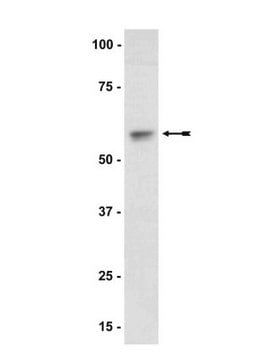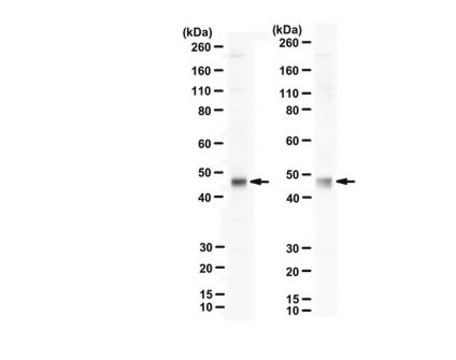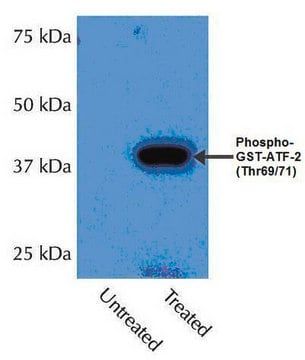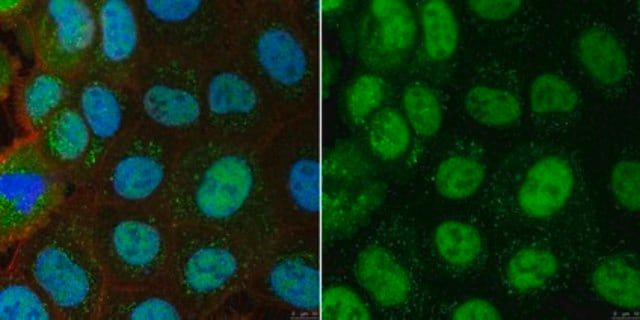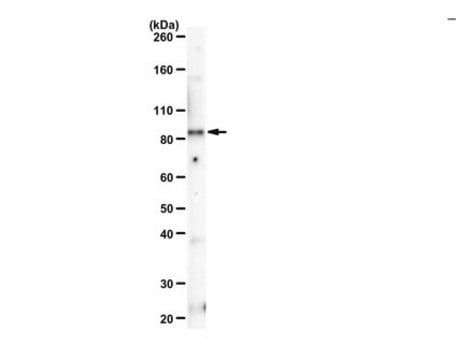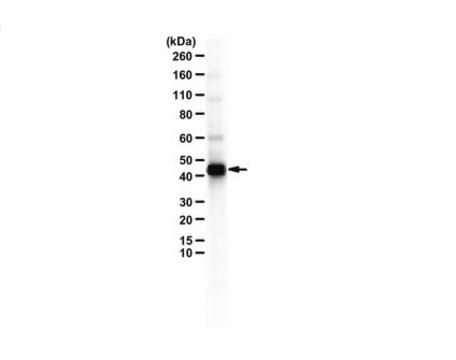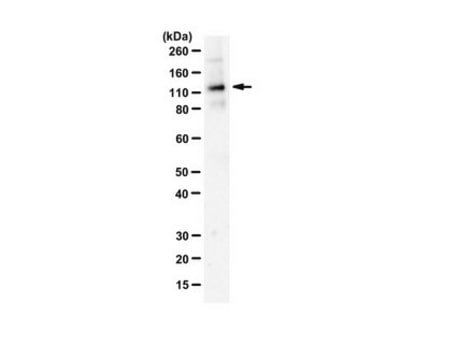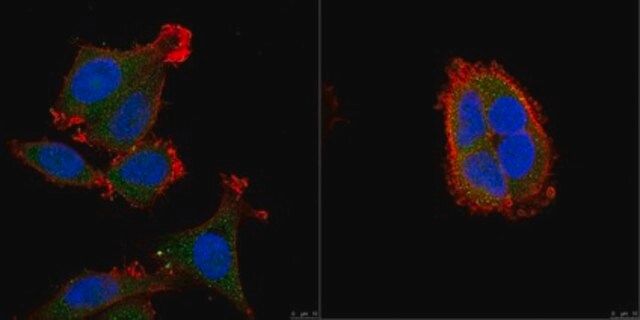ABE2626M
Anti-PASD1
from rabbit
Manufacturer: Sigma Aldrich
Synonym(S): Circadian clock protein PASD1, Cancer/testis antigen 63, CT63, OX-TES 11, PAS domain-containing protein 1
Select a Size
| Pack Size | SKU | Availability | Price |
|---|---|---|---|
| 100 μG | ABE2626M-100-μG | In Stock | ₹ 36,880.00 |
ABE2626M - 100 μG
In Stock
Quantity
1
Base Price: ₹ 36,880.00
GST (18%): ₹ 6,638.40
Total Price: ₹ 43,518.40
biological source
rabbit
Quality Level
100
antibody form
affinity isolated antibody
antibody product type
primary antibodies
clone
polyclonal
species reactivity
human
packaging
antibody small pack of 25 μg
technique(s)
immunoprecipitation (IP): suitablewestern blot: suitable
isotype
IgG
NCBI accession no.
NP_775764
Description
- General description: Circadian clock protein PASD1 (UniProt: Q8IV76; also known as Cancer/testis antigen 63, CT63, OC-TES 11, PAS domain-containing protein 1) is encoded by the PASD1 gene (Gene ID: 139135) in human. PASD1 is evolutionarily nuclear protein that associates preferentially at the periphery of the nucleus with heterochromatin. Human PASD1 contains an N-terminal PAS domain (a.a. 30-102), a central region (a.a. 365-412) essential for its transcriptional repression activity, and two coiled coil domains (CC1/a.a. 365-412 and CC2/a.a. 475-553), where CC1 exhibits significant homology with CLOCK exon 19-coded sequence. PASD1 is related to CLOCK and interacts with the bHLH-PAS transcription complex CLOCK-BMAL1 to repress transcriptional activation. PASD1 expression is normally limited to immunologically restricted germline tissues that do not express class I MHC molecules, such as testis and placenta, allowing tissue-specific circadian rhythms suppression. It is also expressed in a broad range of cancer cells, including melanoma, lung cancer, and breast cancer. It displays widespread expression in solid tumors and diffuse large B-cell lymphoma (DLBCL)-derived cell lines. Isoform 2 is expressed in all DLBCL-derived cell lines, while isoform 1 is preferentially expressed in cell lines derived from non-germinal center DLBCL. When over-expressed, PASD1 inhibits circadian clock function in cancer cells and reducing PASD1 in cancer cells significantly increases the amplitude of transcriptional oscillations to generate more robust circadian rhythms.
- Specificity: This rabbit polyclonal antibody detects PASD1, isoform 1 version 2, in human cells. It targets an epitope within 19 amino acids from the C-terminal end.
- Immunogen: A linear peptide corresponding to 19 amino acids from the C-terminal end of human PASD1, isoform 1.
- Application: Anti-PASD1, Cat. No. ABE2626, is a highly specific rabbit polyclonal antibody that targets Circadian clock protein PASD1 and has been tested in Immunoprecipitation and Western Blotting.
- Quality: Evaluated by Western Blotting in HEK293T cells transfected myc-His Tagged PASD1 lysate V2 isoform.Western Blotting Analysis: 0.2 µg/mL of this antibody detected PASD1 in lysate from HEK293T cells transfected myc-His Tagged PASD1, isoform 1, version2.
- Target description: ~120 kDa observed; 87.43 kDa calculated. Uncharacterized bands may be observed in some lysate(s).
- Physical form: Affinity Purified
- Storage and Stability: Stable for 1 year at 2-8°C from date of receipt.
- Other Notes: Concentration: Please refer to lot specific datasheet.
- Disclaimer: Unless otherwise stated in our catalog or other company documentation accompanying the product(s), our products are intended for research use only and are not to be used for any other purpose, which includes but is not limited to, unauthorized commercial uses, in vitro diagnostic uses, ex vivo or in vivo therapeutic uses or any type of consumption or application to humans or animals.
SAFETY INFORMATION
WGK
WGK 1
Compare Similar Items
Show Difference
biological source: rabbit
Quality Level: 100
antibody form: affinity isolated antibody
antibody product type: primary antibodies
clone: polyclonal
species reactivity: human
packaging: antibody small pack of 25 μg
technique(s): immunoprecipitation (IP): suitablewestern blot: suitable
isotype: IgG
NCBI accession no.: NP_775764
biological source:
rabbit
Quality Level:
100
antibody form:
affinity isolated antibody
antibody product type:
primary antibodies
clone:
polyclonal
species reactivity:
human
packaging:
antibody small pack of 25 μg
technique(s):
immunoprecipitation (IP): suitablewestern blot: suitable
isotype:
IgG
NCBI accession no.:
NP_775764
biological source: rabbit
Quality Level: 100
antibody form: affinity isolated antibody
antibody product type: primary antibodies
clone: polyclonal
species reactivity: mouse, rat, human
packaging: antibody small pack of 25 μg
technique(s): immunocytochemistry: suitablewestern blot: suitable
isotype: __
NCBI accession no.: __
biological source:
rabbit
Quality Level:
100
antibody form:
affinity isolated antibody
antibody product type:
primary antibodies
clone:
polyclonal
species reactivity:
mouse, rat, human
packaging:
antibody small pack of 25 μg
technique(s):
immunocytochemistry: suitablewestern blot: suitable
isotype:
__
NCBI accession no.:
__
